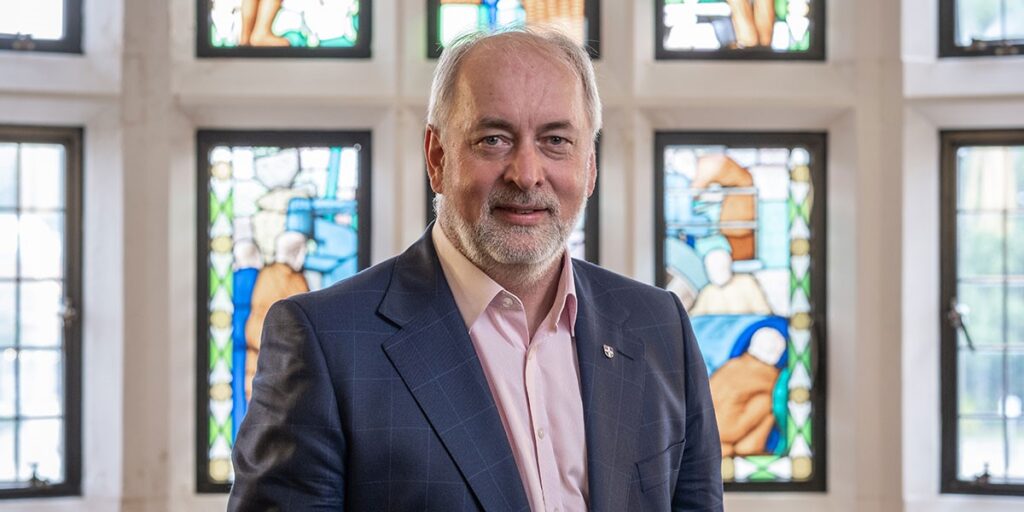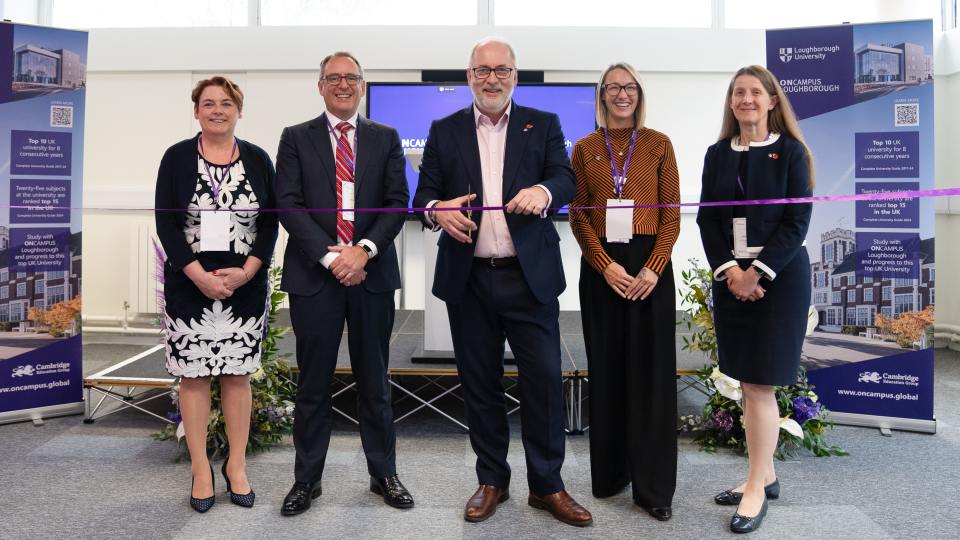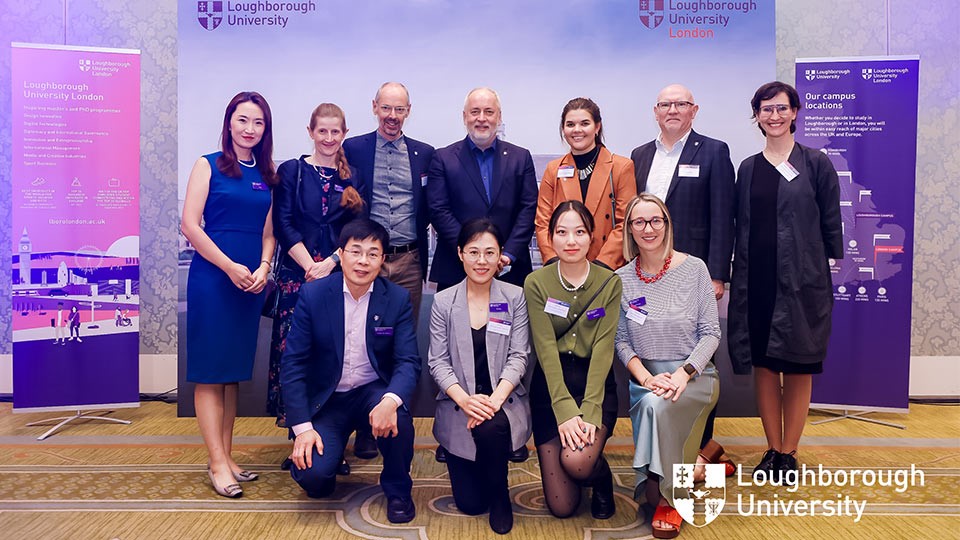From the Vice-Chancellor – November 2023

In my November newsletter: the Research and Innovation core plan, Safer Partnerships and Trusted Research, ONCAMPUS Loughborough, visit to China and Hong Kong, and the emerging Sustainability Strategy.
Research and Innovation core plan approved
Loughborough has always undertaken pioneering research and innovation that makes a real difference to the world; our researchers shape public policy, improve lives and enable business and industry to compete more successfully. We should not be complacent, however, and must continue to enhance what we do if we are to achieve our strategic aim of becoming more research intensive and more innovation driven, and expanding the global impact our work has.
The Research and Innovation core plan, which has now been approved by Senate and Council, outlines the steps we will take over the coming years to achieve those strategic aims. The plan has three overarching, and interlinked, objectives:
- to improve the focus of our activity, aligned to our research and innovation strengths
- to facilitate a culture that encourages imagination, creativity and openness and
- to have a positive influence on the world around us.
Each objective is underpinned by a number of key actions and a series of Key Performance Indicators that will enable us to measure our success. It’s an ambitious plan but we must set ourselves demanding targets if we are to continue to succeed and develop further in a highly competitive global market.
The development of the plan has been led by Professor Dan Parsons (Pro Vice-Chancellor for Research and Innovation), following extensive consultation with groups and individuals across the University. Thank you to all those who contributed to this important piece of work.

Ensuring our partnerships are trusted and safe
The University strategy sets out a bold ambition to grow the global influence and impact of our research, innovation, education and sporting activity. One of the ways we can do this is through the development of substantive partnerships with universities and institutions around the world.
Working in partnership can be hugely beneficial, enabling us to work with the some of the best global organisations to enhance our networks and build our reputation. But we need to be confident about those we collaborate with and their motivations for working with us.
At Loughborough we pride ourselves on being authentic – honest, trustworthy and open – and being responsible – accountable for our actions, caring for ourselves and others. But we must be aware that not everyone shares our values. Some organisations and institutions that we want to work with operate in nations whose democratic and ethical values are different from our own.
We therefore need to be mindful of the national and economic security risks that could ensue from whatever we’re doing. We all have a duty to take a responsible approach to our interactions with external organisations, both at home and abroad, and we should expect this of our partners too.
To support you with this, we have developed some guidance on Safer Partnerships and Trusted Research. The website explains why it’s important to be careful about who we work with and the issues we should consider when entering into partnerships or working in collaboration with others. There is also a Due Diligence tool to guide you through the questions we should ask before every new engagement with a potential partner – whether for research, innovation, education, sport or commercial activity.
None of us wants to believe that another organisation might use their partnership with us for anything other than positive purposes. But we cannot afford to ignore it. So please do take the time to look through the Safer Partnerships and Trusted Research guide and think carefully about the partnerships you have or are entering into. Knowing our partners and managing the risks of our activities proportionately will help to maintain the quality, integrity and reputation of our activity, the University and the UK higher education sector – and ensure the University can work safely towards its strategic aims.

ONCAMPUS Loughborough opens to international students
At the start of the month I was delighted to join colleagues to mark the start of our partnership with Cambridge Education Group, which delivers academic programmes that prepare international students for progression onto leading universities.
Cambridge Education Group now has a dedicated Centre in the Herbert Manzoni building on our East Midlands campus. ONCAMPUS Loughborough supports students with development of the academic skills they need to progress on to an undergraduate or Master’s degree at Loughborough.
Since opening its doors this autumn, the Centre has welcomed more than 180 students and there are plans to enrol more students in the new year.
The partnership with Cambridge Education Group is enabling us to welcome more international students to our campus, and from a greater range of countries. And by making our community more internationally diverse we can offer a more culturally enriching experience for everyone –in line with the objectives of the International Engagement and Impact core plan.

Reinforcing our networks in China and Hong Kong
Advancing our international reputation and profile is a key aim of our University strategy. One of the ways in which we can progress this is through the reinforcement and further development of international partnerships and networks during overseas visits.
At the end of October, I led a delegation of senior staff to mainland China and Hong Kong for a packed programme of activity. This was my first trip to the region as Vice-Chancellor and the first senior delegation to return to China and Hong Kong since the pandemic.
In order to maximise our time during the week-long trip, the delegation was divided into two groups, with one focused on research and innovation and the second centred on education and student recruitment.
Advancing our international reputation and profile is a key aim of our University strategy. One of the ways in which we can progress this is through the reinforcement and further development of international partnerships and networks during overseas visits.
At the end of October, I led a delegation of senior staff to mainland China and Hong Kong for a packed programme of activity. This was my first trip to the region as Vice-Chancellor and the first senior delegation to return to China and Hong Kong since the pandemic.
In order to maximise our time during the week-long trip, the delegation was divided into two groups, with one focused on research and innovation and the second centred on education and student recruitment.
I led the research and innovation track, with visits to Hong Kong, Shanghai, Nanjing and Beijing. At Hong Kong Polytechnic University we explored potential research collaborations in design and engineering; at Tongji University in Shanghai we discussed how our two institutions could work together on topics such as smart matter, AI and cognitive technologies; and at Tsinghua University in Beijing we looked at collaborative research in design and disaster planning.
While in Beijing we held roundtable discussions with industry leaders, to explore how Loughborough could work with local partners on research, innovation and education projects, particularly around our Climate Change and Net Zero strategic theme.
We were able to learn more about one of our recent research partnerships on a visit to the Palace Museum in Beijing. Our academics from the School of Design and Creative Arts have been working with the Palace Museum, the Summer Palace Museum and the Garden Museum on how to combine modern technologies, such as 3D printing, with more traditional restoration techniques. This important work is helping to improve the preservation and curation of historical artefacts.
During the trip I also hosted receptions attended by more than 200 alumni in Hong Kong, Shanghai and Beijing, where I was able to update them on some of recent achievements and developments and tell them more about our ambitions for the next decade, as outlined in our strategy.
The second track of the trip, focusing on education and student recruitment, was led by Professor Rachel Thomson, Pro Vice-Chancellor for Education and Student Experience. The group visited Shanghai University and Beijing University of Chemical Engineering to further the collaborative agreements we already have in place with them.
They also visited the Clover Autistic Children Rehabilitation Centre in Shanghai, meeting staff and children to learn more about the vital work the Centre undertakes. With the support of our alumni, partner organisations and the educational supply shop HOPE Education, the University was able to donate sports equipment, teaching facilities and toys to the Centre.
Overseas trips such as these are hugely important: they allow us to consolidate existing partnerships and explore new ones (in line with the Safer Partnerships and Trusted Research protocols outlined above); they enable us to strengthen connections with our international alumni; and crucially position Loughborough as a university of choice for future students. Thank you to the staff who were part of the delegation and to all those involved in helping to organise it.
Sustainability Strategy takes shape
The climate emergency is one of the most pressing issues facing us today, threatening food sources, livelihoods, economies and people’s lives worldwide.
We all have a responsibility to act, and to act now. Our Climate Change and Net Zero strategic theme outlines how the University will work to address the climate emergency, to support the local, national and global response and to achieve our own University target of net zero from our operations by 2035.
To guide the delivery of the objectives within our theme, we are developing a Sustainability Strategy, with the work being led by the Associate Pro Vice-Chancellors (APVCs) for Climate Change and Net Zero, Dr Kathryn North and Professor John Downey. The APVCs for the three strategic themes are responsible for championing and driving forward interdisciplinary activity across the Schools and Professional Services. The Sustainability Strategy will cover all facets of University life – our research and innovation, teaching and student experience, our partnerships and international engagement, as well as our everyday working practices and the way we develop and manage our facilities and estates.
The Strategy is being developed through a process of iterative consultation. Last month 50 colleagues from across the University took part in a workshop to share their expert insight into the actions that should be prioritised as part of the Strategy. Based on their feedback, further colleagues from across Schools, Professional Services and Loughborough Students’ Union were then consulted on the Strategy’s development. Thank you to those who contributed. The proposed Strategy is now being shared with senior leaders, with the intention for the document, and details of how its delivery will be governed, to be launched in the spring of 2024.
Vice-Chancellor's Communications
Opinions and comment from the Vice-Chancellor, Professor Nick Jennings

